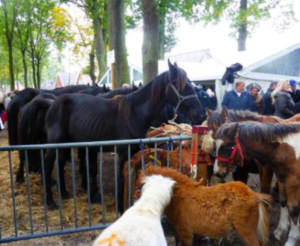البرلمان الأوروبي يصوت على حظر أسواق الخيل
سيصوت البرلمان الأوروبي عن قريب على فرض حظر على أسواق الخيل لرداءة معاملة الخيول. “قد تبدو أسواق الخيول وكأنها معارض ممتعة، لكنها رهيبة بالنسبة للحيوانات”، تقول عضوة البرلمان الأوروبي آنيا هازكامب. ويعتبر اقتراحها في عدم وضع الخيول في السوق، جزء من سلسلة البرامج التي يخطط لها الإتحاد الأوروبي لتحسين رفاهية الخيول.

صورة: عين على الحيوانات
وتقول هازكامب: “إنه لمن المحزن مشاهدة كيف تقف الخيلة مع بعضها. لا يوجد لها مجال للتحرك، غالبا ما تقف طيلة النهار دون أكل وشرب ومحاطة بالضجيج وحشد صاخب”، وتضيف: “معاملة الخيول هي معاملة قاسية. خصوصا أثناء إدخال الخيلة إلى المقطورات. كما تعلن أيضا منظمات الحيوانات بالأخيال المريضة التي تقف رغم حالتها الصحية في الأسواق وبها أمراض معدية”.
ويتبين أنه رغم تطبيق بروتوكول سنة 2011 بشأن الرفق بالحيوان في معارض الخيول، إلا أنه لم يؤدي إلى تحسين وضعية الخيلة. كذلك الحال في البلدان الأوروبية الأخرى مثل بولندا. حيث تبلغ منظمات الحيوانات عن النقص في الغذاء والشرب، مدة التنقل الطويلة وسوء معاملة الخيول.
“مثل هذه الحالات لا تناسب زمننا. يجب وضع حد لأسواق الحصان”، تقول هازكامب. ويرى الحزب من أجل الحيوانات أنه “إلى حين تطبيق الحظر الأوروبي، يجب مراقبة رفاهية الحيوانات بمساعدة الكاميرات الإجبارية”.
The European Parliament will shortly vote on the banning of horse fairs, because horses are ill treated at them. “Horse fairs might look like friendly fairs, but they are terrible for animals,” says MEP Anja Hazekamp. Her proposal to no longer stable horses at fairs, is part of several EU plans to improve the welfare of horse-like animals.

Photo: Eyes on Animals
“It is harrowing to see how the horses are treated. They have hardly any room to move, are often left at the fair without food or drink all day long, and are surrounded by noise and a madding crowd,” according to Hazekamp. “The horses are badly treated. Especially when they are loaded into the horse trailers. Animal organisations also frequently report sick horses, which are still on the market despite of their sickness, with the accompanying danger of contagion.”
Although a protocol for horse fairs has applied in the Netherlands since 2011, it’s evident that this hardly led to improvements. In other European countries too, like in Poland, the situation is untenable. Animal organisations report lack of food and water, long transport hours and ill-treatment of horses.
“Situations like these should belong to the past. Horse fairs should be banned,” according to Hazekamp. “Until a European ban will come into force, animal welfare should be better monitored with the help of mandatory camera surveillance,” according to the Party for the Animals.
Next month, the European Parliament’s Commission of Agriculture will consider the Party for the Animals’ proposal. Early 2017, the full European Parliament will vote on the package of measures to improve the welfare of horse-like animals.